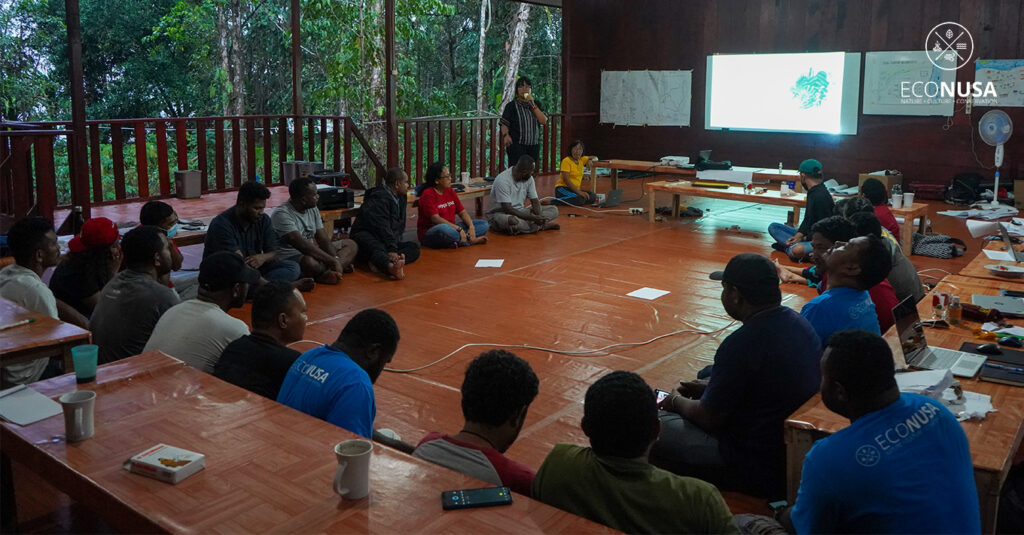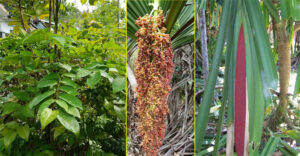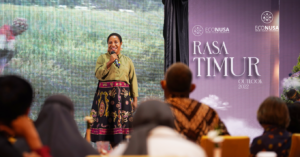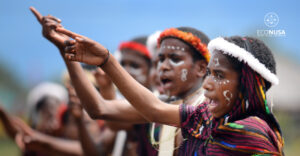
(LC) Mibi at Makbon District, Sorong Regency, West Papua. (Yayasan EcoNusa/Moch. Fikri)
The 30 participants of Community Organizer and Facilitation Technique training shouted the yells together at the Learning Center (LC) Mibi in Makbon District, Sorong Regency, West Papua, on 24 January – 2 February 2022. “Papua, Maluku, we can, anything is possible” is an optimistic yell expressed by field staffers and village cadres believing that anything is possibly done and there is always a way out in eastern Indonesia.
Community organizer does not have any exact science. Thus, none should expect that there are many theories on the issue. “What we got from the ground is the learning materials that we can use,” said Siti Masriyah Ambara, EcoNusa’s Manager for Natural Resources Management, on her closing remark of the training.
The principle of community capacity building in sustainable management of natural resources is one of the missions run by EcoNusa in Tanah Papua and Maluku Island. Capacity building enables life quality improvement which respect customary rights while providing real conservation. “Natural resources management is an ethical collaboration. EcoNusa takes its role in community capacity building. But EcoNusa is not a Santa Claus” said Siti.
Read Also: License Revocation Hearsay, A Spirit Booster
Siti emphasized that field staffers and village cadres are the frontline team on the ground that should work collaboratively. “Community organizer could hardly work without having empathy at heart,” Siti added.
The participants came from 20 EcoNusa staffs and 10 village cadres from Kaimana, Teluk Wondama, Sorong, South Sorong in West Papua, Jayapura in Papua, and Seram Bagian Barat, Banda Island, Seram Bagian Timur, Ambon, in Maluku. They learned some issues on natural resources, concept, principle, and strategy of community organizer, community assembly facilitation, communication art, problem and social analysis, and action plan.
Besides, they also studied popular writing technique, social media content writing, video and photo content production from EcoNusa’s communication team. Doing good with good will are not enough without having a good strategy. “It does not matter what we are doing, or how far we are walking, the most crucial thing is with whom we are walking,” said Vanji Dwi Prasetyo, an EcoNusa staff representing Jayapura, Papua.
Read Also: Zeth Wonggor, David Gibbs, Ecotourism Pioneers (Part I)
Thus, field staffer and village cadres of EcoNusa should have knowledge and capacity to organize the local potential. The community should be regarded as the main subject of development from which the community need and ideas could be generated. They will serve as the local facilitator who is able to analyze problems, find solutions, and can drive the community to make a change.
Meanwhile, the training facilitator, Ita Natailia, highlighted that nothing is impossible to all staffers and village cadres. There are some taboo expressions the field staffers must not utter, such as ‘I can’t do it, it’s impossible, I have no idea, and make it later.’ “When I say ‘I can’t do it’, then our mind and heart will follow so that it will block all opportunities for doing it. Life is dynamic,” said Ita.
It emphasized that all field staffers and village cadres should have social ethics to work with the community. Giving respect to customs, norms, customary law should be taken into serious consideration. Thus, the village cadres should behave well and work in wise manner. “EcoNusa is like a beneficial vehicle that should be utilized. Never let any wave damage the vehicle,” said Siti closing the 10-day training here.
Editor: Nur Alfiyah & Lutfy Mairizal Putra




